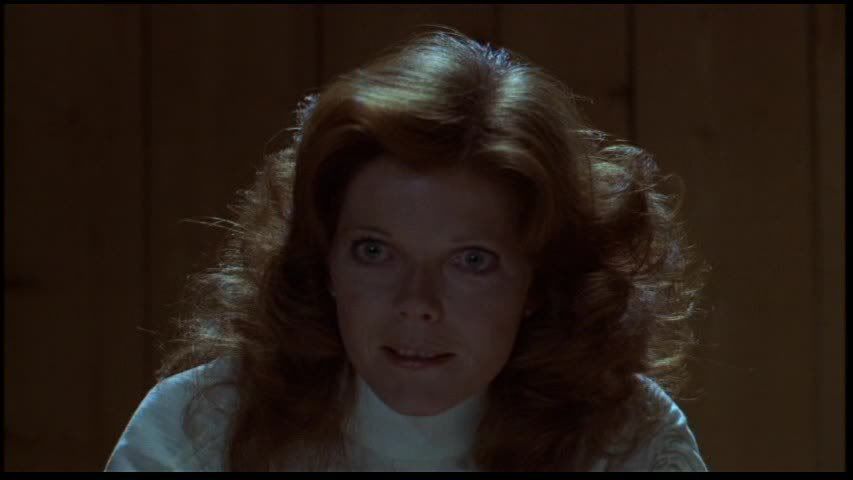
David Cronenberg has made a great number of disturbing films in his career, but perhaps none more viscerally affecting than The Brood, a horror film that aims not so much to scare you as to turn you inside-out, to make you squirm and recoil in disgust. In most of Cronenberg's films, he aims to take internal mental and emotional processes and give them an external physicality, a presence in the world to match their invisible importance in shaping the individual's psyche. The Brood is a film of tremendous physical impact. Its climactic horror scenes elicit none of the jumpy, jittery scares that most horror films resort to in order to provoke reactions, but Cronenberg's horror is no less physical, no less manipulative. It's a creeping, crawling psychological horror, enhanced by the fact that he keeps his little beasties off-screen for so much of the film, and when they finally appear, their awkwardness only accentuates their basic wrongness.
The monsters in question are the mentally generated spawn of Nola, who's played by Samantha Eggar, in a jaw-dropping performance that vacillates from vulnerability to utter creepiness, with a third act transformation that reminds me of Ashley Judd's recent turn in Bug. Nola is being counseled by the controversial psychologist Hal Raglan (Oliver Reed), who believes that negative emotions can be channeled out of the body and manifest themselves in physical form. As it turns out, he's right, and Nola's anger grows into a brood of vicious "children" who respond to the vagaries of her mood by turning on the people she's angry with and killing them. So, basically, it's a horror film about PMS. And in some ways, it's also a viciously misogynistic portrait of motherhood and the parasitic relationship between mother and child. The film reflects a man's fear and distrust of feminine bodily processes and the uniquely privileged mother/child relationship, which is here warped into a nightmarish mockery. The horrors of childbirth, in particular, are explored in brutal detail in the final sequence, which I won't "spoil" for anyone who hasn't seen the film yet — suffice to say, it's one of the most bracing and stomach-turning scenes in cinema. In fact, Cronenberg admits that the film was directly inspired by a rather nasty divorce battle with his ex-wife, and consequently it's a film about the scars, mental and physical, imparted on us by our families and loved ones. Nola was physically beaten by her own mother as a child, and now that she's a mother herself, the suppressed rage bubbles over into her own new family.
It's a fascinating film, precisely because it couches Cronenberg's usual obsession with bodily transformation and the externalization of emotions in a much more straightforward horror context that he would create in his later films. Of course, all of Cronenberg's films might, to one degree or another, be called horror films, but few of them are rigorously scary. Most of his films are too pensive, too withdrawn from the horror of the situations or the characters involved, to really generate the frisson of sympathetic fear that good horror demands from its viewers. Perhaps because this film is so personal, and Cronenberg presumably identifies more closely than usual with its everyman hero, The Brood truly lives up to its billing as a horror flick. The film builds up a slow-burning terror that, strangely, has little to do with the monsters themselves or their actual violent actions. The creatures, though creepy in an alien sort of way, are small and child-like, and can also look faintly ridiculous bundled up in bulky children's coats with thick mittens, waddling around like overstuffed little penguins with hideous faces. So they're not scary in the way that, say, Freddy Krueger is scary. That is, they're not scary just because they're physically intimidating, or because they pose such a horrible threat — though they do rack up quite the body count for such little beasts. The terror in the film arises more from the very idea of these creatures, the knowledge that they are the external representation of ugly human feelings, that they are essentially birthed from the mind. They evoke a squirmy, almost metaphysical dread, the sense that they're somehow filthy, like thoughts that should never be aired so publicly.
This kind of uncomfortable feeling is a typical component in virtually all of Cronenberg's work. His films are not only images of people in the process of externalizing their inner worlds; he wants his audiences to question and think about their own inner worlds. His images are so provocative and over the top precisely in order to spark these examinations, to draw powerful associations between the visceral disgust he's eliciting and the primal human emotions and ideas that are linked to this disgust. In this case: motherhood, childbirth, sex, familial bonds. The film's complex psychological subtext is intimately interwoven with its images of transgressive birthing and warped motherhood, with the frightening idea that children are just the amalgamation of their parents' neuroses and anguish. In that regard, it's telling that the film ends with an image of Nola's daughter (her real one) as her father drives her home. Maybe the film's real horror is the idea subtly buried at its core, that Nola's monstrous "children" are just physically deformed variations on the internal warping of Nola's real child, who is being shaped and hurt by her parents in the same way that Nola was by her own.

No comments:
Post a Comment